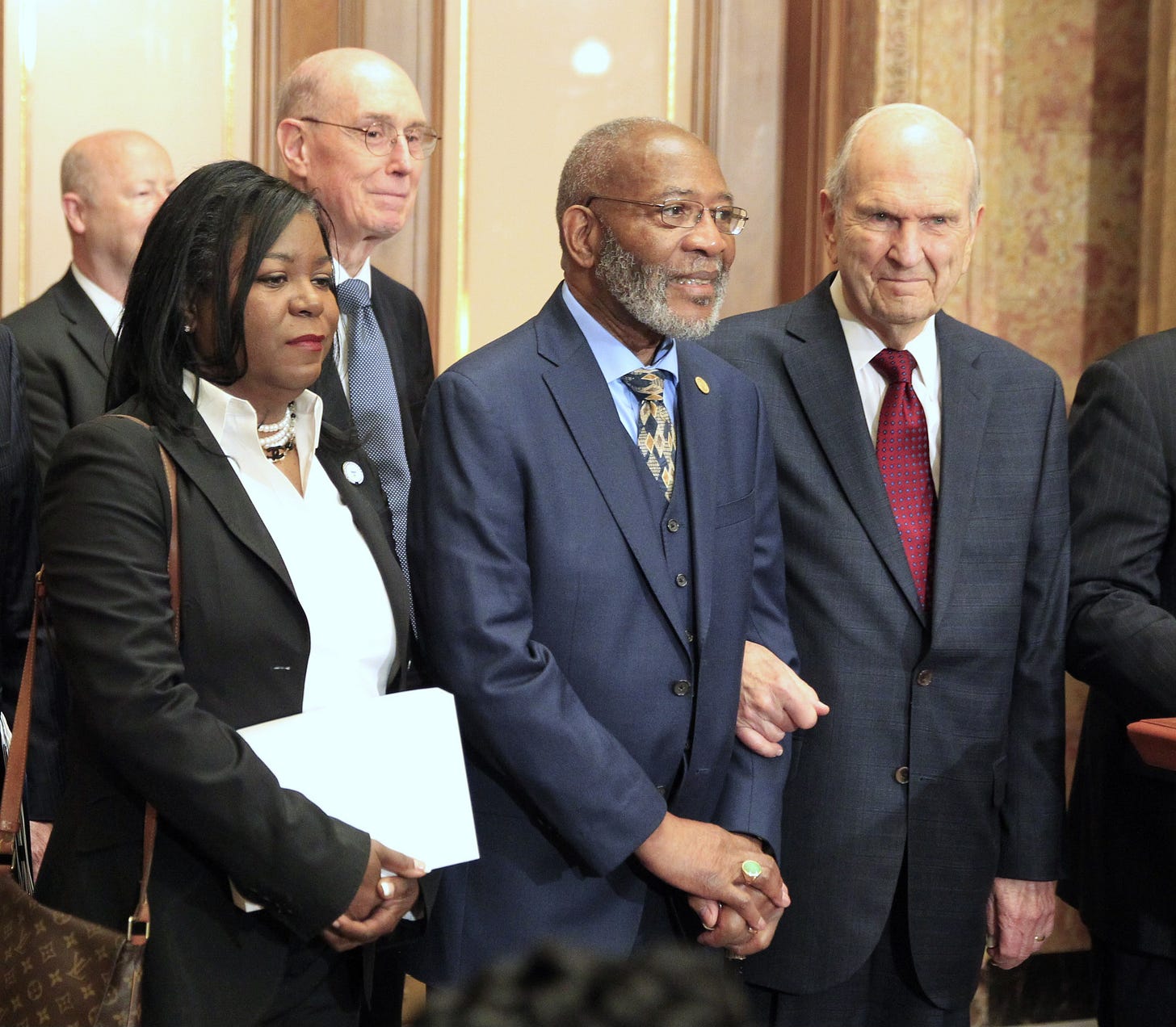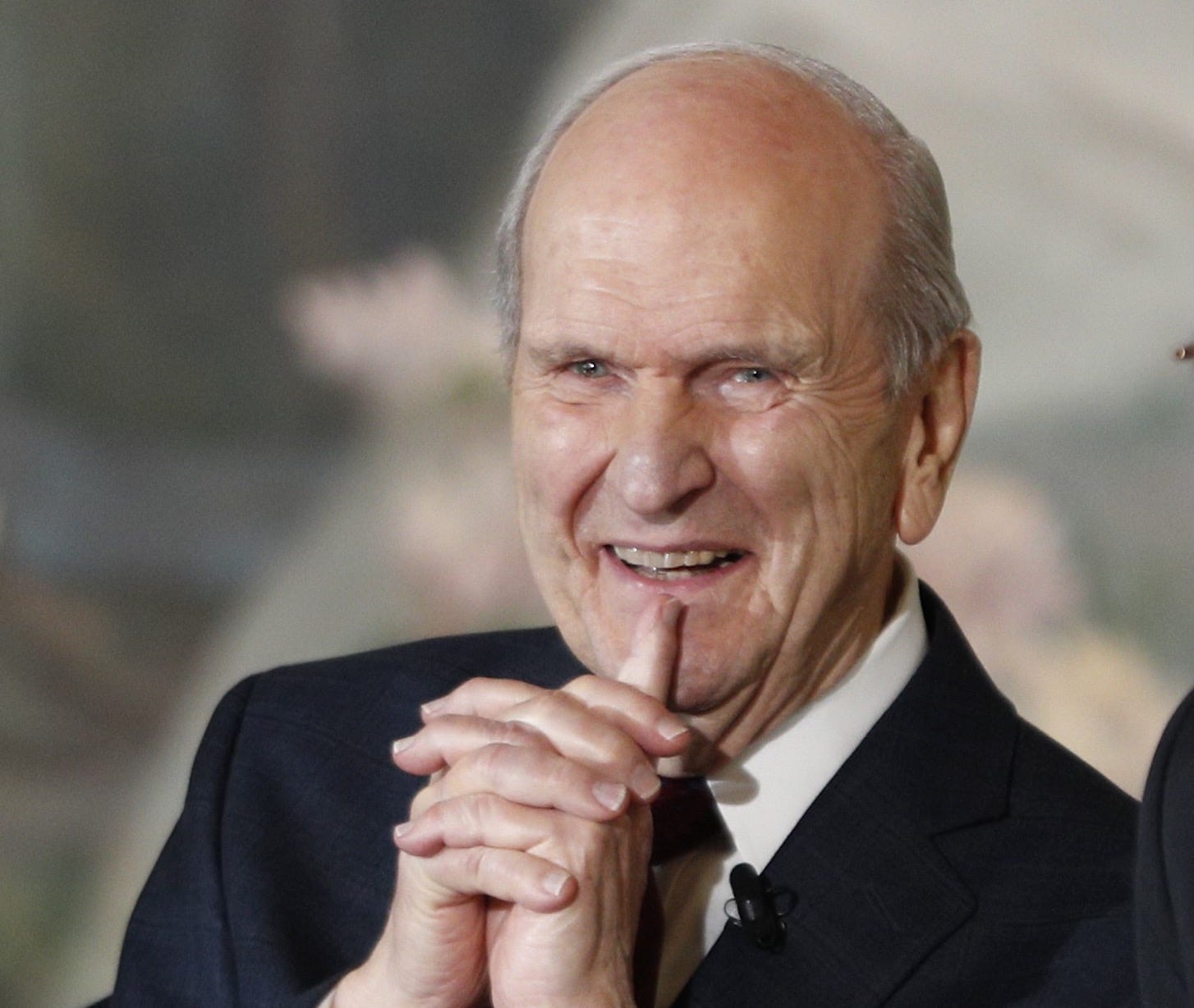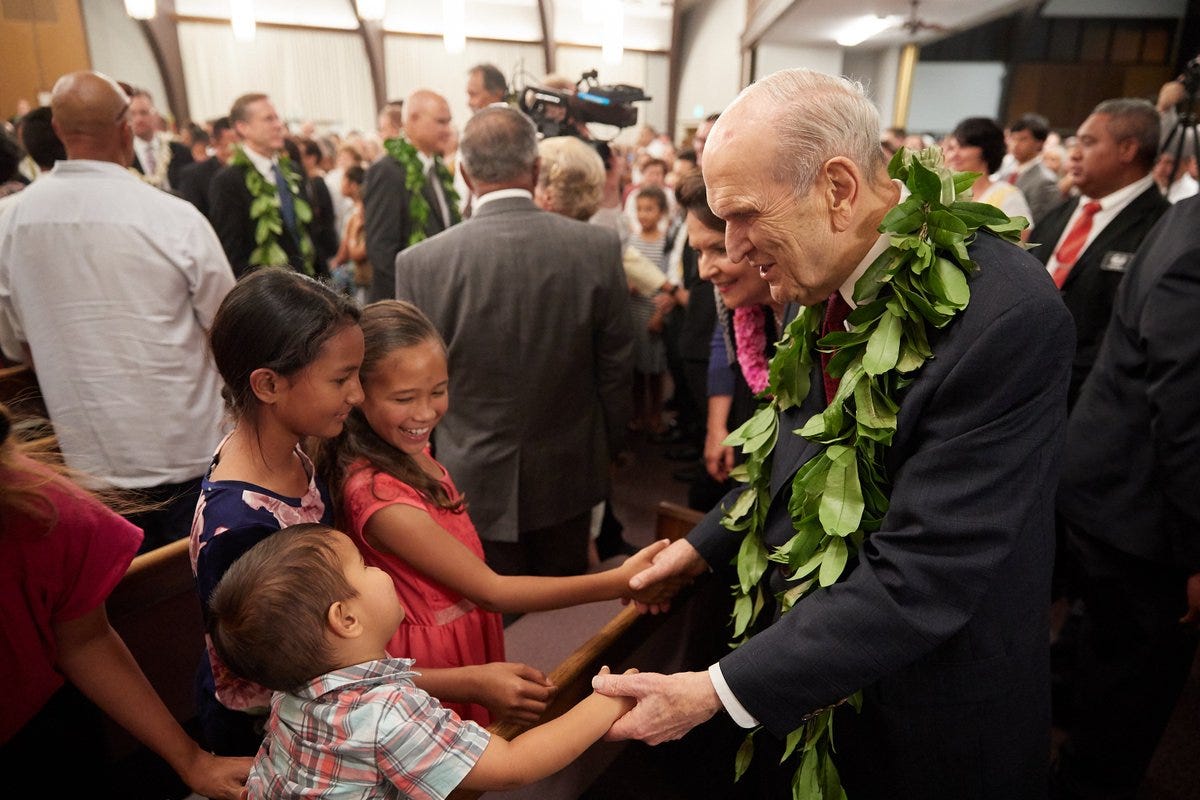Blessed Is The Peacemaker
Chad Ford and Patrick Mason share their personal reflections on the profound influence Russell M. Nelson’s life and teachings have had on them
Russell M Nelson, the 17th President of the Church of Jesus Christ of Latter-day Saints passed away at the age of 101 on Saturday night.
President Nelson’s life and teachings, especially around peacemaking, deeply impacted both of our lives. In fact, it may be fair to say that neither of us would be doing what we are doing — working as peace educators at the Heravi Peace Institute, serving as peacemakers on the ground in conflicts around the world, and starting Waymakers together as a way of training others how to be better peacebuilders — without the influence of President Nelson.
While we mourn his loss, we rejoice in his witness of Jesus and in the way he inspired us, and so many others, to take up Jesus’s call to be peacemakers in the world.
We pray that with his passing, his message will be amplified, and that millions of others will look to Jesus, as he did, to find inspiration, hope, and courage to love our enemies, to reconcile with our brothers and sisters, and to “build bridges of understanding rather than walls of prejudice—especially with those who may see the world differently than we do.”
Both of us wanted to take this moment to reflect personally on President Nelson’s impact on us. We hope that you’ll consider sharing, in the comments below, how his life and teachings impacted you as well.
“The World Needs More Peacemakers”
I met Russell M. Nelson for the first time in early 2007, as a young professor at BYU-Hawaii (BYUH). For the past few years, I had been trying to get an Intercultural Peacebuilding program off the ground at BYUH and was struggling.
Despite President David O. McKay’s founding prophecy that “From this place would go men and women whose influence would be felt for good towards the establishment of peace internationally” and a small endowment set up by generous donors to create the David O. McKay Center for Intercultural Understanding, I was struggling to convince the faculty that an academic program should be the bedrock of our efforts.
I believed it wasn’t going to be enough for students to hear inspiring talks about peacemaking and to take an occasional workshop. Peacemaking is more than just a way of being; it is a skill, and if our students were going to be the type of people President McKay envisioned, they would need intensive, academic, and skills-based training.
Then Elder Nelson had been an inspiration from the start. In the October 2002 General Conference, he gave a remarkable conference address entitled “Blessed Are the Peacemakers” that had laid the seeds for me coming to BYU-H.
In that talk he declared:
Because of the long history of hostility upon the earth, many feel that peace is beyond hope. I disagree. Peace is possible. We can learn to love our fellow human beings throughout the world. Whether they be Jewish, Islamic, or fellow Christians, whether Hindu, Buddhist, or other, we can live together with mutual admiration and respect, without forsaking our religious convictions. Things we have in common are greater than are our differences. Peace is a prime priority that pleads for our pursuit.
I felt a fire inside when he spoke those words. I had been studying peacebuilding for the last decade, but had done so largely separate from my LDS faith. While there were plenty of Christian peacebuilding examples like the Mennonites, Quakers, Dr. Martin Luther King, Howard Thurman, John Paul Lederach, Dorothy Day, and others to draw inspiration from, I struggled to find the same examples and teaching from my own faith.
The lack of focus on Jesus’s call to peacemaking troubled me, and there were times when I questioned whether I belonged to the right tradition. Elder Nelson’s call, especially his focus on peacemaking that transcended inner peace, was all I needed.
He reminded me:
These prophecies of hope could materialize if leaders and citizens of nations would apply the teachings of Jesus Christ. Ours could then be an age of unparalleled peace and progress. Barbarism of the past would be buried. War with its horrors would be relegated to the realm of maudlin memory. Aims of nations would be mutually supportive. Peacemakers could lead in the art of arbitration, give relief to the needy, and bring hope to those who fear. Of such patriots, future generations would shout praises, and our Eternal God would pass judgments of glory.
Three years later, I would accept a position to be the first Director of the McKay Center at BYUH with a goal of putting those ideas into practice.
Yet, many of my colleagues weren’t convinced that peacemaking was a proper academic pursuit. Multiple requests to create courses in peacemaking were rejected, and I was growing frustrated.
Eric Shumway, the President of BYUH, was a believer, however. He was one of the original faculty members of BYUH and had met President McKay. He believed BYUH’s destiny was to produce peacemakers. So he arranged for me to meet with Elder Nelson and Elder M. Russell Ballard— who sat on our board at BYUH.
“Convince them,” he told me, “ and you’ll have your program.”
I was terrified. I had never met an apostle before. I had 15 minutes. I paced the town of Laie the night before at 3 a.m., rehearsing what to say and how to say it. To me, my entire career, both as an educator and a church member, pivoted on the moment.
I don’t actually remember much of what I said.
What I do remember is what happened after I completed my short presentation.
There was a long pause (it was probably 15 seconds, but felt like 15 minutes) before Elder Nelson rose, smiled, and simply said, “The world needs more peacemakers … we should approve this program.”
Elder Ballard and the rest of the board concurred, and then I was ushered out of the room. I sat in the hallway, weeping. My body was filled with the same fire that I had felt when I heard Elder Nelson’s talk. Then suddenly, I felt a hand on my shoulder. I looked up; it was Elder Nelson. He pulled me aside, gave me counsel about how to move the work forward, and told me that I would face a lot of opposition. Then he gave me his phone number and told me to call him if I ever thought about giving up.
Then he reiterated, “The world needs more peacemakers. Go find them. Go teach them. But most importantly, go love them.”
I never called him, even when my mind was filled with doubts about my own inadequacy to lead the program. I wish I would have. I wish I would have told him what his words had meant to me. I wish I would have reported back, directly, the fruits of his decision.
I wish he could have seen the thousands of young women and men, from over 100 countries around the world, who were able to reconcile with a family member or friend, find ways to love their enemies and the people who hurt them, heal from the wounds of conflict, and the hundreds who would train to be mediators, therapists, social workers, diplomats, church leaders, and peacemakers in their homes, communities, and in the world.
In 2023, a little over 20 years after his first conference address on peacemaking, now President Nelson, would stand at the pulpit and deliver an even more powerful and direct call to our people to become peacemakers.
Let us as a people become a true light on the hill—a light that “cannot be hid.” Let us show that there is a peaceful, respectful way to resolve complex issues and an enlightened way to work out disagreements. As you demonstrate the charity that true followers of Jesus Christ manifest, the Lord will magnify your efforts beyond your loftiest imagination.
After his talk, I went to a quiet place and wept again. Now, a person I believe to be God’s prophet on Earth, was calling us all to this unique form of discipleship. He was reminding us that we show our love for God by showing our love for neighbor and enemy. He was calling us, the same way Jesus called his disciples on the Sermon on the Mount, to be peacemakers.
He would reiterate that call in 2025:
As followers of Jesus Christ, we should lead the way as peacemakers. As charity becomes part of our nature, we will lose the impulse to demean others. We will stop judging others. We will have charity for those from all walks of life. Charity towards all men is essential to our progress. Charity is the foundation of a godly character. Let us plead with our Heavenly Father to fill our hearts with greater charity—especially for those who are difficult to love—for charity is a gift from our Heavenly Father for true followers of Jesus Christ. The Savior is the Prince of Peace.We are to be His instruments for peace.
And again, just a few weeks ago in an essay for his 101 birthday in Time Magazine:
A century of experience has taught me this with certainty: anger never persuades, hostility never heals, and contention never leads to lasting solutions. Too much of today’s public discourse, especially online, fosters enmity instead of empathy. Imagine how different our world could be if more of us were peacemakers—building bridges of understanding rather than walls of prejudice—especially with those who may see the world differently than we do.
Those words were not merely words to President Nelson. He lived them in his relationships with others. He reached out and made allies with many important non-LDS organizations and created a legacy of peace in his actions.
He inspired so many to take up his mantle and create peacemaking organizations and encouraged us in our personal lives to put an end to enmity.
When I was invited to join the faculty at Utah State University and the Heravi Peace Institute in 2024, I had a deep fear that I would be leaving behind students, a peacebuilding program, and a legacy created by President Nelson that I loved and had dedicated 20 years of my life to.
I kept feeling a deep, spiritual pull to go, but wrestled daily with the ramifications of that decision for my family, the peacebuilding program at BYUH, and for President Nelson.
I still had his number. I thought about calling so many times. I felt he’d tell me to follow the spirit, and that was what I was afraid of. What I wanted was for him to tell me to stay where it was safe, comfortable, and to not push me further away from my home to an area of the world that I had never lived.
In the throes of making that decision, I got a phone call from someone in the Church. He had heard that I might be coming to Utah. I told him I was wrestling terribly with the decision and subtly insinuated that maybe he could reach out to President Nelson on my behalf to help me know what to do.
“What is God calling you to?” he replied. “I think he’s calling me to Utah,” I replied.
“Then you already know what to do,” he replied. “And just in case you didn’t, why do you think I called?”
So, I packed up my family, left behind my amazing students and colleagues at BYUH and moved here. Within days I started partnering with Patrick Mason and so many wonderful people at USU, Faith Matters, Disagree Better, the Salt Lake Interfaith Council, at the Utah Council of Conflict Resolution, at TurnTowardUs, to keep his vision alive here —in this place —where the Saints once sought refuge from conflict, that now, more than ever, needs to be a light on the hill for the rest of the world.
And so for all that loved President Nelson, and for all of those who want to find ways to put his call into action, will you join us?
The world needs more peacemakers.
True Disciples of Jesus Christ Are Peacemakers

by Patrick Mason
“The Savior’s message is clear: His true disciples build, lift, encourage, persuade, and inspire—no matter how difficult the situation. True disciples of Jesus Christ are peacemakers.”
My heart sang when President Russell M. Nelson spoke these words in the April 2023 General Conference. I don’t think it was just confirmation bias. More than that, it was because in the deepest part of my soul I knew his words were true. And furthermore, that they were prophetic for a world on the brink.
Most General Conference talks are forgotten within days, weeks, or months of when they are given. By the time the next Conference rolls around six months later, it’s as if the prior one hardly happened. That’s a feature of a church that believes in continuing revelation.
I’m convinced, however, that of all President Nelson’s dozens of Conference talks, “Peacemakers Needed” will still be read a hundred years from now. Why? Because it articulates Jesus’s never-ending call for His followers to be peacemakers as well or better than any other talk given by a church president. For countless years to come, when Latter-day Saints study about how the Lord wants us to respond to conflict, we will turn to the scriptures, and we will turn to President Nelson’s talk.
Prophets speak the truths we need to hear, not always what we want to hear. President Nelson spoke to a world rife with conflict of all kinds, from internal stresses and anxieties to broken marriages to communities and congregations divided over politics to nations at war. Members of the church are not immune to any of those conflicts. One of the most memorable moments in his address came when President Nelson said:
At this point you may be thinking that this message would really help someone you know. Perhaps you are hoping that it will help him or her to be nicer to you. I hope it will! But I also hope that you will look deeply into your heart to see if there are shards of pride or jealousy that prevent you from becoming a peacemaker.
The words of prophets apply to nations, but fundamentally they cut to the core for each individual listener. Yes, we need an end of hostilities in Ukraine, Gaza, and Sudan; as President Nelson said in April 2022, “Any war is a horrifying violation of everything the Lord Jesus Christ stands for and teaches.” But true peace does not begin with ceasefires on the battlefield. It begins with a transformation of the heart.
In his last words to the world, published in Time magazine, he said: “After more than a century of life and decades of studying both the human body and the human soul, I have found this to be true: we are happiest when we remember our divine worth and extend that recognition to others.”
Rest in Christ, President Nelson. You’ve run your race well and set an exemplary pace for us to follow. Now it’s our turn to take the baton.






In the aftermath of the Charlie Kirk tragedy my brother Matt challenged me to read or listen to President Nelson’s 2023 Peacemakers talk for 10 straight days. It has changed me profoundly, and hopefully, lastingly. I am constantly challenged to turn inward to find the shards of pride that prevent me from peacemaking. Thank you both for the beauty of your work and bless you in your efforts to share the Savior’s greatest teaching.
Thanks for these personal stories. I am moved by your desires and grateful for your work especially among our little tribe. In the next century we LDSaints can quietly but intrepidly change our brand by ‘outdoing’ our wonderful rivals as courageous peace builders among groups that sincerely disagree about value priorities and the common good. With an expansive vision of Zion missionaries of diverse persuasions will cooperate in the creative tension of peaceful co-resistance as they continue to seek (and live) the whole truth together. Onward!